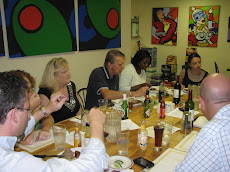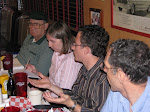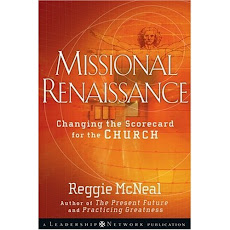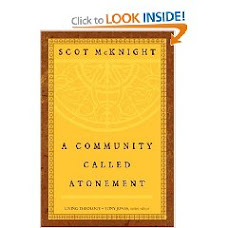 Seven of us braved the rain last Tuesday night to continue our discussion on what emerging or missional church should look like. Steve F.’s wife Linda joined us along with Flavio’s friend, Shannon, as newcomers. Robin M. started us off by introducing church boundary concepts from “Who is in? Who is out?” http://files.meetup.com/1198907/Who%20is%20In%20Who%20is%20Out.doc based on Stuart Murray’s book Church Planting: Laying Foundations, paraphrased below:
Seven of us braved the rain last Tuesday night to continue our discussion on what emerging or missional church should look like. Steve F.’s wife Linda joined us along with Flavio’s friend, Shannon, as newcomers. Robin M. started us off by introducing church boundary concepts from “Who is in? Who is out?” http://files.meetup.com/1198907/Who%20is%20In%20Who%20is%20Out.doc based on Stuart Murray’s book Church Planting: Laying Foundations, paraphrased below:Bounded set – there is a clear line between the church and the world outside the church. Church members are required to subscribe to these boundaries and violation leads to exclusion.
Fuzzy set – there is more room for ambivalence, where doctrinal and ethical issues are open to debate rather than being resolved. There are still boundaries that can be violated, but these are less clear.
Open set – There are effectively no boundaries except those which are self-imposed. Belief and lifestyle are not matters of community concern.
Centered set – a dynamic, rather than static model, where the direction in which a person is facing is more important than their distance from the center. With Christ as the center, where a person is in relation to them is not as important as the direction that their life is traveling. This idea may result in someone whose lifestyle seems good, but is moving away from Christ, while someone who is new to the faith (or even still seeking) is moving towards.
While knowing Christ, and being a disciple or Christ-follower, is still paramount, some said churches can overemphasize the boundaries rather than the journey (Centered set). This can result in a de-emphasis on the importance of community, once someone is “saved,” along with an overemphasis on conformity to the “club rules” as opposed to growing in the direction of loving God and loving others - the “Jesus Creed”. One person reminded us that from God’s perspective, “we’re all out,” (except for Christ in us).
Shannon, who works as a DJ, said he was “saved” (and glad he was) a few years ago in a mega church, but found himself not only alone in a crowd but being told he could no longer associate with the friends he used to have. He explored a small local emergent church community (which was rejected by the mega church) and found real friends. How so? They are authentic, open, non-judgmental, and rather than having all the answers, “…can disagree at times, but all stay centered in God.” Shannon said being part of such community helped him…grow closer to God and to others.
So, do numbers matter? If mega churches can miss community, is church growth important? We were reminded of the fellowship of believers in Acts 2 where, “…the Lord added to their number daily…” When Shannon did meet up with his old friends, now as a Christ-follower, his love extended to one friend who he allowed to detox on his couch. The hope is that one day this friend can similarly reach out to others in need of God’s love and healing. Steve F. reminded us that God’s love starts with those closest to us, and that we can be more intentional about how we relate to those our own homes. He gave an example of how he relates to Linda. Church is in the end relational: Us toward God, and toward each other.
Flavio mentioned a "community experiment," "Buy Nothing New in October" ("NoNO") http://mennohaus.com/ which led to a discussion on social justice. How can American Christians look at global poverty and justify lifestyles of consumerism? Jim offered that “tithing” can be graduated: the more you earn above median, the higher you go above 10%…”giving to those as have need.” (Acts 2:45)
We also talked about how some “club house” churches can create barriers to ministering to the poor and homeless. But can it work the other way? Can there be churches where persons of upper socio-economic status might not “feel the love”? Its possible congregations can become “boutique” churches, catering to certain ethnic, age or socio-economic demographics rather than the diversity found both in our communities as well as in the Body of Christ. This led us back to what’s important. In “Five Streams,” Scot McKnight writes, “First, the emerging movement becomes missional by participating, with God, in the redemptive work of God in this world. In essence, it joins with the apostle Paul in saying that God has given us "the ministry of reconciliation" (2 Cor. 5:18). Second, it seeks to become missional by participating in the community where God's redemptive work occurs. The church is the community through which God works and in which God manifests the credibility of the gospel.”
McKnight would, “…ask churches to begin by spelling out outcomes (and [he’d] want them to be loving God and loving others) and [he’d] ask pastors and leaders and churches to shape everything in that direction. How often have our churches been taught ‘how’ to love and ‘what loves looks like’ and ‘how we can become more loving’ (of God or others)? If this is the Jesus Creed, then why is it not more central to our focuses?”
What has love looked like in your life, and in our broader church?
Peace & Blessings,
Steve
P.S. Since Tuesday night, the after-conversation has been provocative, and I think ultimately bodes well for future discussion and Kingdom building. Some people have suggested that at our next meeting, a few of us “share our stories” of what led us here, in some depth. This will no doubt lead us into a variety of topics. And after all, “church is relational.”













No comments:
Post a Comment